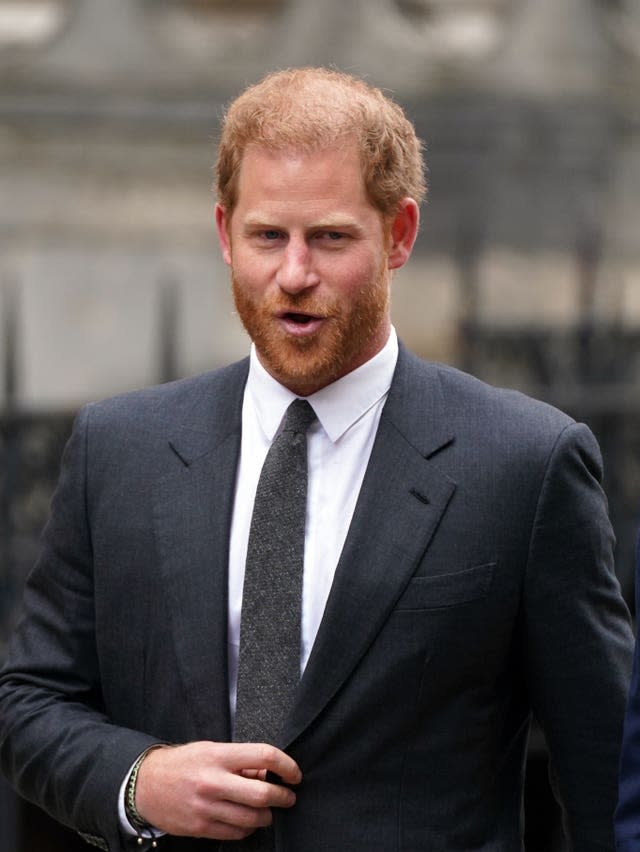What is the status of the Duke of Sussex’s High Court claims?

The withdrawal by the Duke of Sussex of his libel claim against the publisher of the Mail on Sunday is the latest stage of his multiple High Court legal battles with newspaper publishers.
Harry, 39, sued Associated Newspapers Limited (ANL) over a February 2022 article about his legal challenge against the Home Office, following a decision to change his publicly funded security arrangements when visiting the UK.
The duke’s lawyers claimed the story “purported to reveal, in sensational terms” that information from court documents “contradicted public statements he had previously made about his willingness to pay for police protection for himself and his family whilst in the UK”.
ANL contested the claim and on Friday a spokeswoman for the publisher confirmed to the PA news agency that Harry had withdrawn his case.
The decision to discontinue the claim means the duke is now involved in four cases at the High Court, including phone hacking cases against Mirror Group Newspapers (MGN) and News Group Newspapers (NGN).
Here is an overview of the cases:
– Unlawful information-gathering claim against MGN
In a rare royal event, Harry entered a High Court witness box in the trial of his damages claim against the publisher of the Daily Mirror, the Sunday Mirror and Sunday People.
The world’s media descended on a courtroom in London to see the duke give evidence across two days in his contested claim against MGN over allegations its journalists were linked to voicemail interception, securing information through deception and hiring private investigators for unlawful activities.
In a ruling in December, Harry was awarded £140,600 in damages after Mr Justice Fancourt ruled the duke’s phone was probably hacked “to a modest extent” by the publisher.
The judge said that 15 of the 33 articles examined at trial “were the product of phone hacking of his mobile phone or the mobile phones of his associates, or the product of other unlawful information-gathering”.
A further hearing is now expected in this case in the coming months.
– Unlawful information-gathering allegations against ANL
Harry is one of seven high-profile people, including Sir Elton John and Baroness Lawrence of Clarendon, bringing legal action against the publisher of the Daily Mail over allegations it carried out or commissioned unlawful information-gathering.
The firmly denied allegations against ANL include the hiring of private investigators to place listening devices inside cars, the “blagging” of private records and the accessing and recording of private phone conversations.
At a preliminary hearing in March, the publisher asked a judge to rule in its favour without a trial, arguing the legal challenges against it were brought “far too late”.
The duke made a surprise appearance at the Royal Courts of Justice in London for the March proceedings, where his lawyers argued that those bringing legal action were “thrown off the scent” and not aware of being targeted, having believed “categorical denials” from ANL over any involvement in unlawful activity.
Mr Justice Nicklin ruled in November that the publisher had failed to deliver a “knockout blow” to the early stage legal challenges, allowing them to continue.

The duke’s lawyers are planning to ask ministers for permission to use confidential documents from the Leveson Inquiry into press standards after the judge ruled they could not be used while restrictions were in place.
A further case management hearing may be held in early March this year.
– Allegations of unlawful information-gathering at NGN
Harry and actor Hugh Grant are suing NGN, publisher of The Sun and the now-defunct News Of The World, over alleged unlawful information-gathering.
The duke alleges he was targeted by journalists and private investigators working for the papers.
At a preliminary hearing in April, the publisher asked a judge to throw out his and Mr Grant’s claim, arguing they were brought too late.
Mr Justice Fancourt later ruled that Harry and the actor’s claims could go to trial, except for any allegations relating to phone hacking.
The judge also refused to allow the duke to rely on an alleged “secret agreement” between the royal family and senior executives working for media mogul Rupert Murdoch as part of his claim.
Harry’s lawyers had argued that NGN’s challenge to his claim was an attempt to go behind the alleged agreement, which they said had prevented him from bringing his case.
NGN, which denies any unlawful activity took place at The Sun, disputed such an agreement was in place.
Harry’s claim is currently set to go to trial in January 2025.
– Challenge against the Home Office over UK security arrangements
The High Court recently heard Harry’s claim against the Home Office over security arrangements for himself and his family when they are in the UK.

The duke is challenging a February 2020 decision of the Executive Committee for the Protection of Royalty and Public Figures (Ravec), which falls under the remit of the department, after being told he would no longer be given the “same degree” of personal protective security when visiting.
Harry’s lawyers say he was “singled out” and treated “less favourably” in the decision, arguing a failure to carry out a risk analysis and fully consider the impact of a “successful attack” on him meant the approach to his protection was “unlawful and unfair”.
The court heard the duke believes his children cannot “feel at home” in the UK if it is “not possible to keep them safe” there.
The Home Office says Ravec was entitled to reach the decision it did, which is that Harry’s security arrangements will be considered on a case-by-case basis.
Mr Justice Lane will give his ruling over the claim at a later date.


